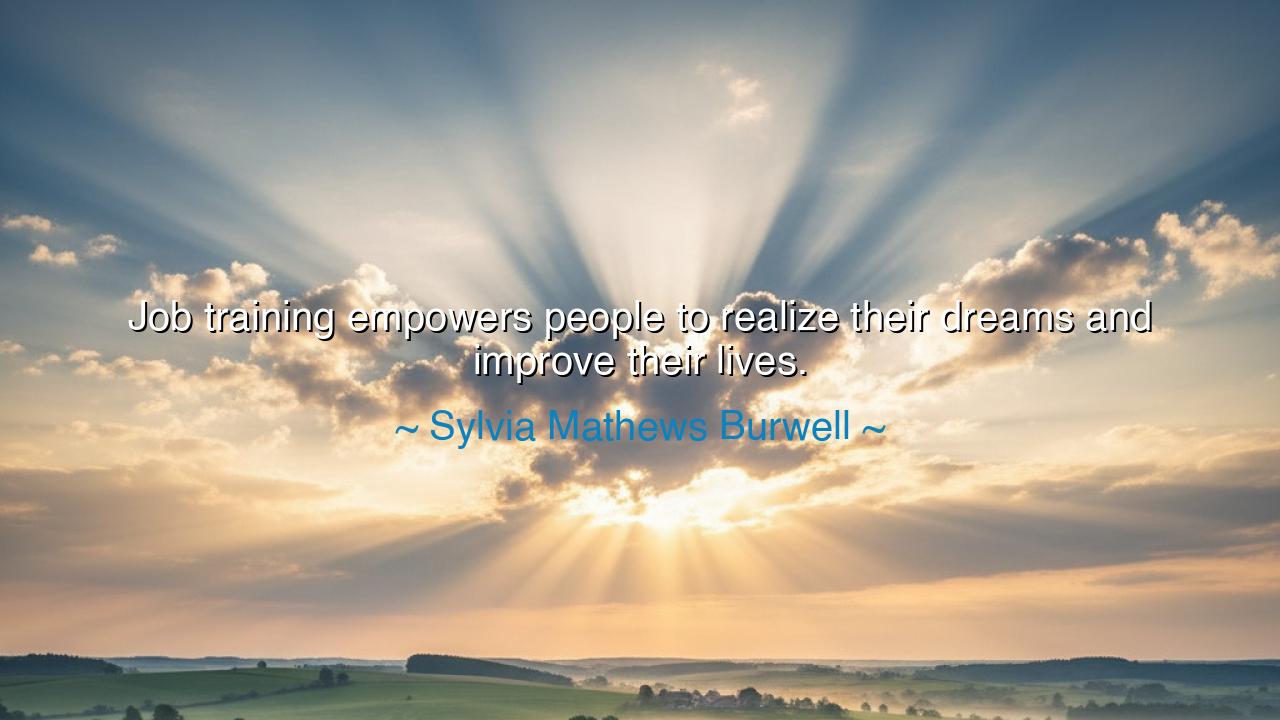
Job training empowers people to realize their dreams and improve






“Job training empowers people to realize their dreams and improve their lives.” Thus spoke Sylvia Mathews Burwell, a leader of service and education, whose words shine with the quiet wisdom of one who believes not in charity, but in empowerment. Her statement is not merely about labor or learning; it is about the sacred dignity of purpose — the belief that every human being, when given the tools to grow, can rise from despair to fulfillment. In her words we hear the ancient truth that has guided nations and civilizations: that knowledge joined with skill gives birth to freedom.
Burwell’s words rise from her long devotion to public service — from her years working in leadership at the Bill & Melinda Gates Foundation, to her role as U.S. Secretary of Health and Human Services. In each path, she sought to uplift not through handouts, but through opportunity. When she speaks of job training, she speaks of giving people not a fish, as the proverb says, but teaching them how to fish, how to build, how to create. For to train the mind and the hand is to awaken the potential that already dwells within each soul — to transform helplessness into capability, and capability into destiny.
This truth is as old as time. The ancient teachers knew that skill is the bridge between dream and reality. Consider the story of the craftsmen of Florence in the Renaissance, where the poor apprentices who once swept the floors of workshops rose, through learning and perseverance, to become masters of art and architecture. From the hands of those who were trained came the domes, cathedrals, and sculptures that still stand as symbols of human possibility. Michelangelo was once an apprentice; Leonardo da Vinci, once a student in another man’s studio. Job training — the transfer of knowledge, the cultivation of mastery — turned their dreams into monuments that have outlasted centuries.
Burwell’s quote reminds us that empowerment is not a gift bestowed by the powerful, but a process that ignites the power within the individual. The one who learns a skill gains not only a trade, but self-worth — the confidence to shape their life rather than accept its limitations. It is through the act of learning, of mastering a craft or discipline, that a person realizes they are not merely at the mercy of circumstance, but participants in creation itself. In this way, training is not just economic—it is spiritual, for it awakens the belief that “I can.” And from that belief, whole worlds are born.
Let us remember also the story of Booker T. Washington, who, born into slavery, rose to found the Tuskegee Institute in Alabama. He believed, as Burwell does, that education and skill are the keys to freedom. Through his institution, thousands of men and women learned not only to read and write, but to farm, to build, to design, to lead. His graduates carried their knowledge across the South, transforming broken communities into thriving ones. Washington once said, “Excellence is to do a common thing in an uncommon way.” That excellence, he knew, came from training — from the daily discipline that turns hope into habit and habit into greatness.
Burwell’s teaching also carries a warning to the modern world: dreams without training are fragile. A person may dream of flight, but without learning the laws of wind and motion, they cannot build wings that last. To empower people, therefore, we must not only inspire them, but equip them — with education, with mentorship, with real opportunities to practice what they have learned. Dreams must be anchored in skill, for skill gives the dream strength, endurance, and shape. Without it, even the brightest vision fades with time.
Therefore, my children of tomorrow, take this lesson to heart: to learn is to rise. Seek always to refine your mind and your craft. Do not envy those who are already great, but follow their path — study, practice, persist. When you master a skill, you master a piece of the world. And when you teach others, you give them not mere knowledge, but the power to improve their lives. For every person trained is a flame lit against the darkness of despair; every skill learned is a seed of transformation planted in the soil of humanity.
So let Burwell’s words guide you: Job training empowers people to realize their dreams and improve their lives. Work to empower others, and in doing so, you strengthen the fabric of the world. Remember that no gift is greater than the ability to build, to create, to serve. For dreams without hands are only clouds — but dreams guided by skill and spirit become the mountains upon which civilizations stand.






AAdministratorAdministrator
Welcome, honored guests. Please leave a comment, we will respond soon